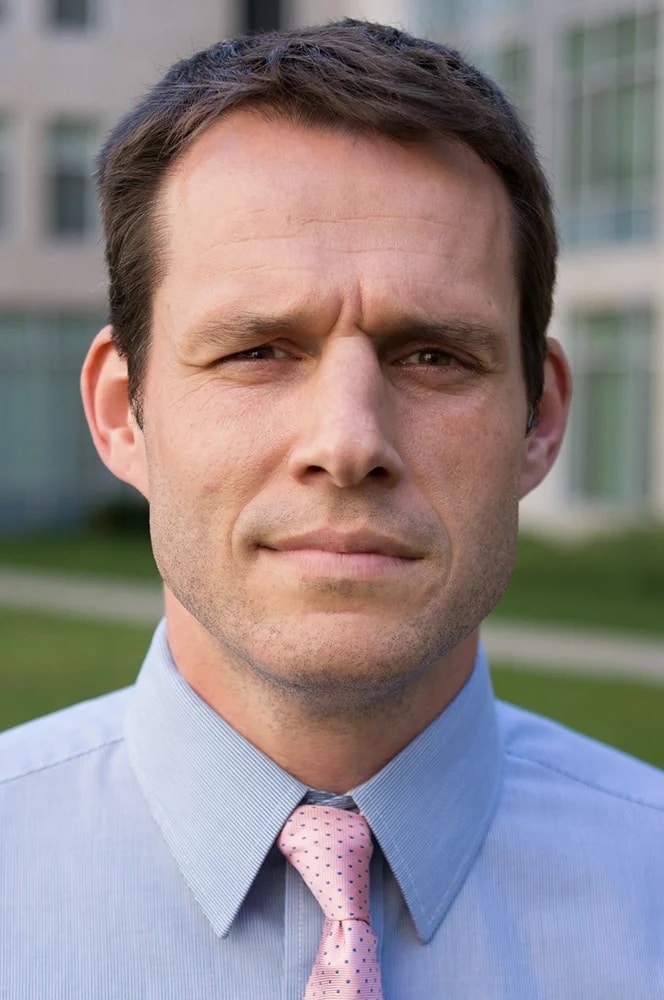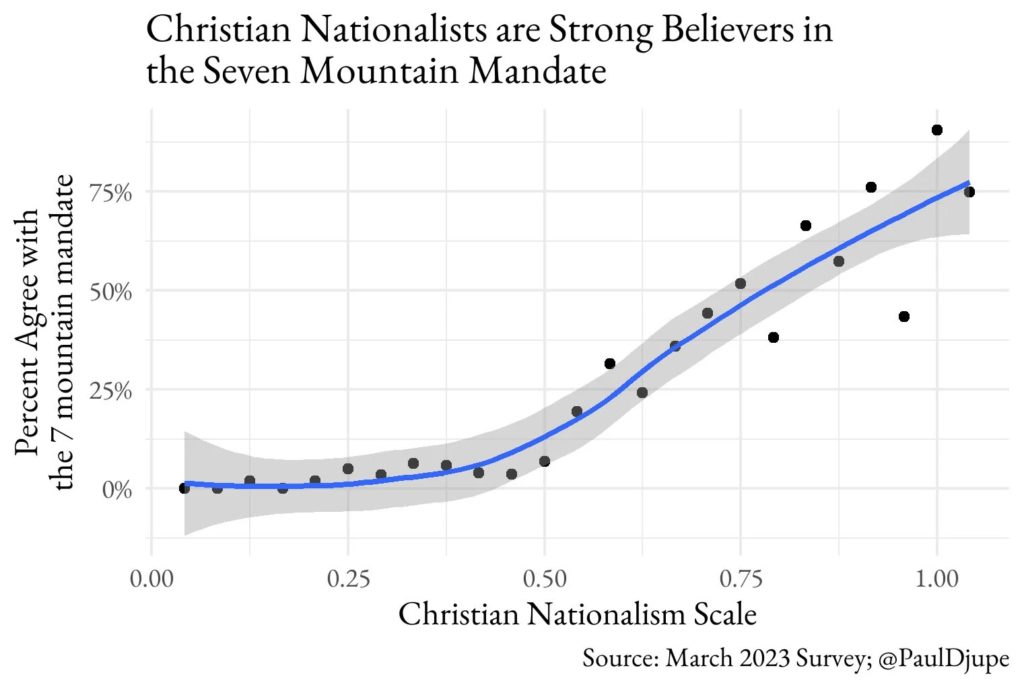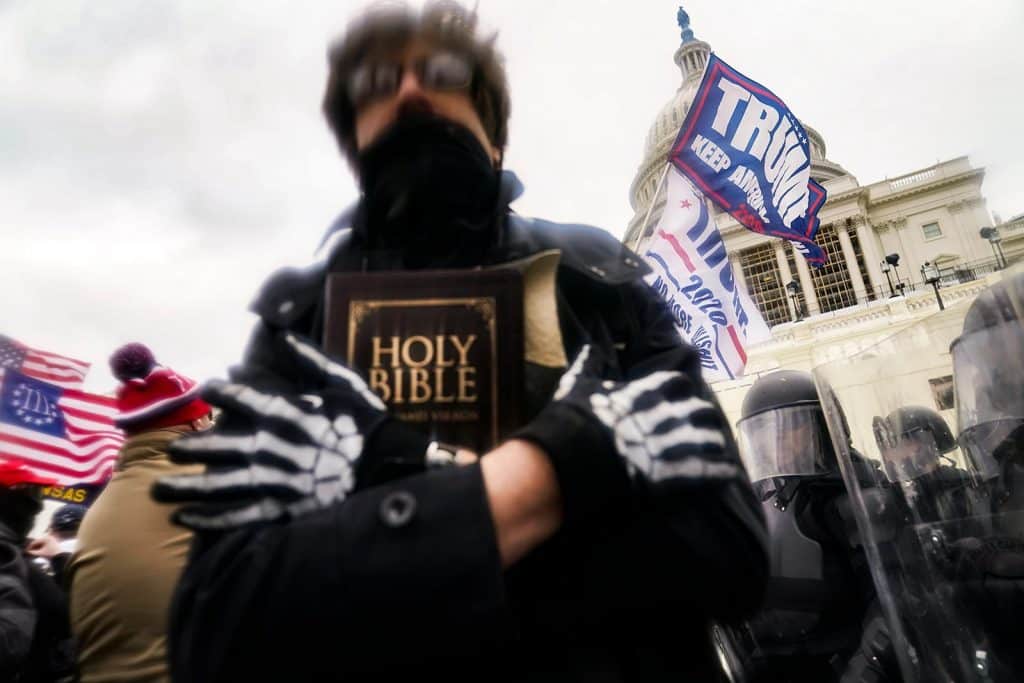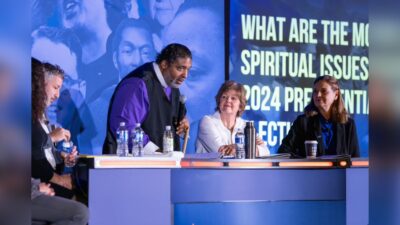Julie Green had good news when she stood up to speak during the ReAwaken America Tour’s latest stop last week at the Trump National Hotel Doral near Miami.
God had told her that Joe Biden was on his way out, she said, according to videos of the event. And God’s people were going to win.
“We’re in the greatest battle for the soul of the nation this nation has ever been in since the founding of this nation,” said Green, an Iowa pastor known as a charismatic prophet and fervent supporter of former President Donald Trump.
God’s people, as Green’s theology makes clear, are her fellow Christians. And they would win, she added, because they would not give up: “You’re not quitting on what is rightfully yours,” she told the audience.
Green’s comments captured an essential element of Christian nationalism: The idea that America belongs to and exists for the benefit of Christians. Green’s fellow ReAwaken America Tour speakers — disgraced former Lt. Gen. Michael Flynn, Roger Stone, Eric Trump and MyPillow CEO Mike Lindell, alongside pastors and prophets — are some of the loudest and best-known proponents of the ideology, which helped fuel Trump’s rise to the White House and has made national headlines since the Jan. 6 riot.
Your tax-deductible gift helps our journalists report the truth and hold Christian leaders and organizations accountable. Give a gift of $30 or more to The Roys Report this month, and you will receive a copy of “Hurt and Healed by the Church” by Ryan George. To donate, click here.
But its ubiquity, and the charge it carries in the current political debate, has made Christian nationalism a seemingly infinitely malleable term, one directed at times at anyone who supports Trump or any part of his agenda, and adopted by some who call themselves Christian and take patriotic pride in their country.
As a result, few people actually understand what Christian nationalism is, said University of Oklahoma sociology professor Sam Perry, co-author with Andrew Whitehead of “Taking America Back for God: Christian Nationalism in the United States.”
That doesn’t stop anyone from having an opinion about Christian nationalism, Perry said. “Either they’re very much for it or they’re very much against it.”

Perry argues that Christian nationalism is not a synonym for evangelical Christians. And not everyone who “votes their values” — a term often used by politically active conservative Christians — qualifies as a Christian nationalist. Nor do people who want religion to play a part in public life, he said.
Perry and Whitehead have defined Christian nationalism this way: “a cultural framework that blurs distinctions between Christian identity and American identity, viewing the two as closely related and seeking to enhance and preserve their union.”
In an interview, Perry contrasted that view with “civil religion”— when the Rev. Martin Luther King Jr. invoked the promises of the Declaration of Independence or President Barack Obama led a grieving congregation in singing “Amazing Grace.” These moments combined spiritual ideas and political moments.
Christian nationalism, Perry said, is more about who should be in charge.
“The difference between Christian nationalism and civil religion is Christian nationalism says this country was founded by our people for a people like us and it should stay that way,” said Perry.
In order to see how many people subscribed to this idea, Perry and Whitehead looked at data developed for the 2017 Baylor Religion Survey, which asked Americans to respond to statements such as “The federal government should declare the United States a Christian nation” and “The federal government should advocate Christian values.” The Baylor researchers also asked about prayer in school and the separation of church and state.
In an interview, Perry said that some of the Baylor questions were a start, but the answers they yielded were too vague. He and Whitehead, along with other researchers, have fielded several national surveys in the past two years that Perry said have helped differentiate Christian nationalism from other, adjacent beliefs.
In 2022, the Pew Research Center found that 60% of Americans surveyed agreed the nation’s founders intended the country to be a Christian nation. Forty-five percent agreed the U.S. should be a Christian nation. But even among those who say the country should be a Christian nation, only about a quarter said the country should be declared a Christian nation (28%) or should advocate for Christian values (24%). About a third said the government should stop enforcing the separation of church and state.
A recent survey from the Public Religion Research Institute found that 10% of Americans embrace Christian nationalism, while an additional 19% are sympathetic to its ideals.
Paul Djupe, a political scientist at Denison University and co-author of an upcoming book called “The Full Armor of God,” recently retested some of the Baylor survey questions with some modifications. He wanted to know, for example, what people meant by America being a Christian nation and what it means to promote Christian values.
 Does the latter mean promoting a more just society or one that sees everyone as made in God’s image? Does it mean values like loving your neighbor? Or does it mean enforcing Christian views over other views?
Does the latter mean promoting a more just society or one that sees everyone as made in God’s image? Does it mean values like loving your neighbor? Or does it mean enforcing Christian views over other views?
When Djupe modified Baylor’s statement “The federal government should advocate Christian values” to add “for the benefit of Christians,” he found there was little drop-off in support for that statement, leading him to suspect that those who support that statement had a more exclusive view of those values.
His survey also asked people to respond to the statement: “The Church should have a final say over whether legislation becomes law in the U.S.” Those who supported such a veto correlated highly with those who scored high on Baylor’s Christian nationalist scale.
Djupe found enduring support for a doctrine known as the “Seven Mountains Mandate,” which claims Christians should rule in seven sectors: home, religion, schools, business, media, entertainment and government.
The idea was popularized by leaders such as Bill Bright, founder of Campus Crusade, a prominent evangelical campus ministry now known as Cru, and Loren Cunningham, longtime leader of Youth with a Mission, whose “7 spheres of influence” echoed the seven mountains.

It was later adopted by charismatic leaders such as Lance Wallnau, known for his prophecies that Trump was God’s anointed.
“It’s like king of the mountain, only with much higher stakes,” said Djupe.
Matthew D. Taylor, a Protestant scholar at the Institute for Islamic-Christian-Jewish Studies in Maryland, says that the idea of dominion over all areas of life is central to what he refers to as Christian supremacy, a term he prefers to Christian nationalism.
Christian supremacy, he said, is more about Christians ruling over others. Taylor, creator of the “Charismatic Revival Fury” podcast series, which looks at the role charismatic Christian beliefs played on Jan. 6, pointed to prophets such as Green, who supported Trump because God told them who he wanted to be president.
“That’s deeply anti-democratic,” he said. “You can say, God has appointed this person. But that is not how democracy works. “
Taylor said that existing research into Christian nationalism is concerned with beliefs about the history and identity of the United States, but it misses the idea that “Christians should be privileged in society and should exert a coercive effect on society.”
“I think a lot of times people are trying to say, ‘America was founded with Christian values and these things are embedded within the essence of America,’” he said. “But it doesn’t say much about policy.”

Sarah Posner, a journalist and author of “Unholy: Why White Evangelicals Worship at the Altar of Donald Trump,” recalled seeing Christian nationalist themes in 2011, at the Response, a God and Country prayer rally organized by then-presidential candidate Rick Perry. “It was definitely ‘we need to take back America,’” she said.
But before the Trump era, that meant using democratic means. Since 2020, Posner said, the focus has been on rejecting the results of elections. “Before Trump, no one had permission to stage a coup.”
She said that the arguments over specific definitions of Christian nationalism can overshadow the movement’s main focus, which is power.
“Christian nationalism is not a pejorative. It is a description,” she said. “They have said that America is a Christian nation. How much clearer do they have to be?”

Julie Ingersoll, professor of religious studies and author of “Building God’s Kingdom: Inside the World of Christian Reconstruction,” pointed out that Christian nationalists don’t necessarily share a single theology. Influential religious figures such as R.J. Rushdoony and other conservative social and political activists known as “reconstructionists” have long believed that Christians should have dominion over the world. But their theology is different from that of charismatics like Julie Green.
“It’s fluid and messy,” she said. “People want to make it neat and clean and divide these groups up and put them into little boxes with labels on them. Because that is more comfortable.”
But Ingersoll said religious differences between Christian nationalism and the broader evangelical movement are less important because, she argues, both are as much political as they are theological.
Still, she stresses that when Christian nationalists say that their candidate or party was chosen by God to win, they really mean it. And they may not be willing to let democracy get in the way of God’s will.
“The niceties of democracy fall by the wayside when you are on God’s side fighting Satan.”
 Bob Smietana is a national reporter for Religion News Service.
Bob Smietana is a national reporter for Religion News Service.



















38 Responses
What is sad for me as a Christian and as a Republican is that these fringe figures are no longer fringe. They are mainstream.
Julie Green, the “prophetess,” was just invited to Trump’s Doral Hotel to speak and share the stage with Eric Trump, Roger Stone, Michael Flynn and Trump’s pillow guy.
Her nutty prophecies include:
– In 2022 God’s Angel of Death would take out Nancy Pelosi, Chuck Schumer, Mitch McConnell, Lindsey Graham,
– Chief Justin John Roberts would be exposed for molesting children on Jeffrey Epstein’s island.
– Joe Biden is dead, and it will be exposed that Barak Obama is controlling Biden’s body double through an earpiece.
– She prophesied several times last year that Trump would be reinstalled as president.
https://www.rollingstone.com/politics/politics-news/doug-mastriano-julie-green-prince-charles-queen-elizabeth-1234592789/
Where are the true Christians who follow Trump who are willing to call out heresy?
Last I saw, Rev Jeffress and Franklin Graham were promoting Trump spiritual advisor Paula White’s latest prosperity book.
THIS. Thank you, Greg. While I am not a Republican, I have been frustrated by witnessing this exact issue.
I actually think both parties are doing a poor job at silencing their extremist/fringe voices. When you get past them, you realize a significant voting bloc has a lot more in common than we’re led to believe.
Looks like the book endorsements were from 2019.
https://www.christianpost.com/news/evangelical-leaders-come-under-fire-promoting-paula-whites-new-book.html
Thanks for chronicling these past prophecies that are demonstrably untrue. Growing up in this world, there was a lot of emphasis on shutting off one’s brain and taking the prophets at their word. There are often so many prophecies from these people (a firehose) that it becomes impossible (or just difficult) for people to go back and fact-check them.
Christian nationalism is an idol forged in the alloy of religious and political power. Power is the idol.
Donld Trump posessed a demonic discernment that was keen to the ripeness of American Christianities desire for a King like unto all the other nations. There has been a prophetic Samuel minority who have been trying to tell the church they already have a King. But we have been rejected. But it is not we who are rejected by this Babylon harlot. It is God they have rejected.
It has become a religious cult. They’ve convinced the biblically illiterate that a prophet can get it wrong and not be a false prophet. Many of these phonies have gotten rich on it.
Christian? Follower of Christ. Nationalism ? One’s identification with one’s own nation. These identifications are dative or locative. Problem is we do not properly define these terms. According to an accurate definition. I am a Christian/Nationalist. Think for oneself and do not need politicians nor media to encapsulate what defines oneself. My definitions of these dative identities is based on The Bible, the Constitution and Bill of Rights. My ultimate identity is in Christ which always Trumps Donald Trump or Joe Biden.
James, you are missing one key part of the technical definition of nationalism:
“One’s identification with one’s own nation, especially to the exclusion or detriment of the interests of other nations.”
Leaving off half of the definition changes it entirely, and makes it sound “not so bad.”
Truth is, being a Christian should be in conflict with the latter half of this definition of nationalism. God is no respecter of persons, calls us to treat others as we’d like to be treated, and clearly states that the ground is even at the foot of the cross – regardless of nationality.
In order to be a naturalized citizen, you have to forsake all other nations or allegiances. SO, your definition of nationalism is based on a worldview that no nation is any better than any other, which isn’t true by any stretch of the imagination.
It appears that you’re wrong, Jonathan. The US does not require naturalized citizens to forsake all other nations. That said, I think you’re purposefully blurring the distinction between nations and people. I can have no desire to further the interests of a foreign government, but have a desire to further the interests of those living in a foreign country. I don’t object at all to supporting missionaries in Africa, for example, even though their work is not necessarily furthering the US agenda.
Quoting:
https://travel.state.gov/content/travel/en/legal/travel-legal-considerations/Advice-about-Possible-Loss-of-US-Nationality-Dual-Nationality/Dual-Nationality.html
Section 101(a)(22) of the Immigration and Nationality Act (INA) states that “the term ‘national of the United States’ means (A) a citizen of the United States, or (B) a person who, though not a citizen of the United States, owes permanent allegiance to the United States.”… U.S. law does not mention dual nationality or require a person to choose one nationality or another. … Dual nationals owe allegiance to both the United States and the foreign country. They are required to obey the laws of both countries, and either country has the right to enforce its laws. It is important to note the problems attendant to dual nationality.
Marin, I doubt you run your family this way. There is nothing wrong with self-interest. Sometimes this has to be to the exclusion of others. A person breaks into my home to bring danger to my family, my love for them compelled me by the law of Christ to defend them even if it result in the death of the aggressor. You assume that “exclusive” or “detriment” always means doing harm or evil to others. It does not.
Do I look out for and prioritize my family? Yes.
Do I denigrate and belittle others for not being in my family, calling them names or ranting about how they deserve less for daring to not be born into my family? No.
Go read speeches by self-professed nationalists. They are full of the latter. That is problematic.
We as Christians should not excuse it.
I had nothing to do with where I was born. I give thanks to God AND extend grace to others born elsewhere, as it’s not their “fault.”
Wait a sec, Marin. You’re agreeing that it’s okay to prioritize our families, but it’s not okay to prioritize American citizens?
Can you explain that one? Thanks.
Cynthia –
If you don’t know how to prioritize your family WITHOUT belittling or degrading others, I don’t know what to tell you. I love my family. I look out for my family. I know how to do that without belittling or calling those who aren’t in my family names, believing they are are inferior or that they somehow deserve less for daring not to share blood or a last name with me. Why is it ok to aim such arrogant, condescending nastiness at them because we aren’t related? This is where I disagree.
The problem with a lot of nationalist comments, beliefs, attitudes and postings are things like calling immigrants “dirty” , “aliens” (we are all humans), or claiming they are inferior to us or deserve less than us. It’s sad that many Christians see no problem with this, or play naive to how un-Christlike this is.
Too many “Christian Natonalists” (oxymoron) act as if they “did” something to be an American that automatically makes them better than others.
Be grateful to God for where you born (hint: He did that, not you!), and be a responsible citizen accordingly. Don’t wield it as a weapon to cut others who were born elsewhere down.
You got that from google. Marin. Definition used to not include that. Period.
It’s actually in the dictionary. I know it is updated as language evolves, but to study anthropology or linguistics is to know that the meaning of words does evolve over time.
Another example: gay used to mean happy.
Saying “it used to mean ___!” won’t get you out of some horrible misunderstandings.
Marin
It has been culturally defined. As to relate to those who believe that the election was stolen or support Trump. Henceforth… The update!
The dictionary is updated every year, adding new words and colloquialisms, and updating definitions to reflect the current usage. The dictionary also keeps past meanings in there to reference how a term has evolved – like the past and present meaning of the word “gay”. Or “woke”.
And one does not have to be a Republican nor a Trump supporter to be a Christian nationalist (nor does one have to be a progressive to be “woke”). Nothing in the definition says this or makes this connection. You are reading your own interpretation into something that is not there, and trying to portray Trump supporters as victims. It’s unnecessary because it’s untrue.
Christian nationalism is defined twice the article above. First it is defined as: “The idea that America belongs to and exists for the benefit of Christians.” Then it is defined (by other scholars) as: “a cultural framework that blurs distinctions between Christian identity and American identity, viewing the two as closely related and seeking to enhance and preserve their union.” All scholars explicitly deny that simply being a Christian who identifies with their own country makes you a Christian nationalist.
At the same time, there is no “accurate” definition of Christian Nationalism. There are different definitions that capture slightly different aspects of the phenomenon. But they are ALL pointing toward a specific expression of Christianity and nationalism that is observable. It is pointless to make the definition so broad that it does not capture the phenomenon that this article is discussing. We can all see that there are SOME Christians who believe that God created the United States for some special redemptive purpose and that Christians are supposed to be in control of the United States government and culture. This is not a definition of CN, but it describes something we can see happening, so we need to come up with some definitions that (imperfectly) capture this thing.
So it’s fine to disagree with any particular definition, but then how would you want to define this kind of phenomenon where people believe the United States is *more* central to God’s redemptive mission than, say, Kenya, Guatemala, or China? I would suggest that anyone who DOES think that the U.S., as a political entity, has some eternal purpose, and that the laws of the US *should* serve Christians over other religious groups, then that is a pretty good illustration of Christian Nationalism right there.
It’s very disturbing that the Christian faith has been hijacked by ideologies that run contrary to the teachings of the New Testament.
Claiming that God is on your side (Or vice versa) is dangerous.
In order to actually present valid data about so-called “Christian Nationalism,” an instrument will need to be developed that clearly defines it. Actually, the instrument itself will have to constitute the definition. Otherwise, people all over the political spectrum will remain confused about what it actually means.
For example, of COURSE we should want to promote Biblical values. Does this mean we prefer those kinds of values over others? Of course it does! We prefer not stealing to theft, not abusing children to abusing them, not committing adultery to committing it, etc. All Christian values, all Biblical values, all life-affirming values…all good for our nation and every nation on earth.
There are universal principles that transcend nationalities, but there is nothing wrong with loving one’s country. Patriotism is perhaps a better word-choice for this love than nationalism.
I agree on prefering Biblical values – but that should be rooted in a personal relationship with God through Jesus and the Bible. It should NOT mean “only people of my faith, who agree with my understanding of scripture should get to hold office”, “my faith should be the official religion of the nation”, “we should shape laws that enforce only my faith”, or “REAL Americans are Christians (or even more alarmingly, vice versa)”.
This is where it’s getting dangerous, exclusive, idolatrous, elitist, and unBiblical.
“I agree on preferring Biblical values – but that should be rooted in a personal relationship with God through Jesus and the Bible.”
Actually, Muslims and Jews hold to some Biblical values. They may know Jesus, they may not.
Yes, it’s known that Muslims and Jews hold to some Biblical values due to the overlap between religious texts (Bible, Torah, Qur’an). And they know OF Jesus due to references in these texts.
But they do not know Him – as in, they do not have a personal relationship with Him as Lord, Savior and Son of God.
Marin:
I agree with what you are saying here, but you contradicted your other statement that stated preferring Biblical values “should be rooted in a personal relationship with God through Jesus and the Bible.”
So, which is it: Do people need a personal relationship with God through Jesus and the Bible in order to prefer Biblical values, or can they prefer Biblical values simply because those are the best values for human beings?
Please clarify. Thanks. Knowing OF God is far different from having a personal relationship with Him.
Cynthia –
To answer your question, no people don’t have to have a personal relationship with God through Christ to prefer or appreciate Biblical values. I think of those who say things like “Jesus was a great man”, “we should all live by the Golden Rule” (a Biblical principle), or “all religions point to the same good path”. I even had college professors who appreciate the “perfectly poetic way” the Bible is written, and see it as a text to emulate based on its impeccable literary factors (yes, had that said to me).
This is different from trying to establish Christianity as the official religion of the nation, or mandating Christian beliefs. Legalism doesn’t make disciples – and isn’t that our goal?
I would think as Christians we would want people to come to prefer and appreciate Biblical values NOT because “that’s the law”, “they are perfectly written”, or “it’s just nice to treat people that way”, but because one understands the Bible is the inerrant word of God that guides us in how to live and how to have a relationship with Him through Christ.
It is also important to remember that “biblical values” are basically encapsulated in Jesus’ command to love one another. Sometimes that means “one another” becomes Christian and believes as we do, and sometimes it simply means that we love and give because these are the right things to do, and we expect no return.
So yes, we should advocate for “biblical values” — love one another. Not control, not gaining preference.
A former President of the United States was convicted for a sex crime last week, and I heard few concerns from evangelicals. What I heard was that the judicial system is politicized or corrupt.
Christian Nationalism is filling the vacuum caused by the collapse of the U.S. evangelical movement …. if only 4% of adults in the U.S. now hold a biblical worldview, there is not much that can be done to recover…
There is nothing worse than hearing an evangelical say they believe and love Jesus… and then go on to spout a bunch of conspiracy theories and half-truths……
Gordon:
God can do absolutely anything. He continues to build his church all over the world. I wouldn’t spend any time worrying about the USA’s “evangelical movement.” It is the Church that matters, and it stands strong.
Gordon, it was a civil lawsuit not a criminal trial. Thus, he was held liable not convicted. The burden of proof needed is much different also.
I think what’s being misunderstood here in regards to Christian Nationalism is that it is a mix of radical alt-right politics, me focused, biblically illiterate Christianity. Plus, add in a tad bit of if you don’t look, talk, act, or think like me exclusivity.
For example, Marjorie Taylor Greene, Charlie Kirk, Tucker Carlson, Josh Hawley and the like. They are pushing a false gospel and it’s pushed its way into the church. As a result, it has caused massive division and many people have left the church over political issues and have in some extreme cases walked away from their faith because of the ugliness of the church over the last 7+ years.
We as the have to do better, instead of demanding we be known for a political stance we need to be known for our love for Jesus and others above anything and everything else!
There is only one Theocracy and that was ISRAEL NO other country is as far as God is concerned until the Millennium anyway
The Christian faith has always battled various sorts of syncretism. I think the picture of Jesus with a MAGA hat captures what Christian nationalism is pretty well.
Marin:
Before I respond to your last comment, thanks so much for sharing your thoughts. I enjoy communicating with you here because I believe your heart is always in the right place. With that in mind, here is my response:
“If you don’t know how to prioritize your family WITHOUT belittling or degrading others, I don’t know what to tell you.”
Whatever gave you the idea that prioritizing my family had anything to do with belittling or degrading others? How could I love my family well if I did not love others? Indeed, Jesus calls all of us who call ourselves his followers to love others as we love ourselves.
“The problem with a lot of nationalist comments, beliefs, attitudes and postings are things like calling immigrants “dirty” , “aliens” (we are all humans), or claiming they are inferior to us or deserve less than us.”
I grew up with people from all kinds of ethnic backgrounds, so I could never call immigrants “dirty.” Indeed, I grew up overseas. However, I do believe that when it comes to living in another country, one must respect its residents. This goes for our country (the USA) too. Crossing a border illegally just to get work is, in my opinion, incredibly disrespectful of that country’s long-time residents. When living in someone else’s nation, we always tried to respect their laws and people. Should American citizens expect any less?
My question was never answered by you, so here it is again: Why is it okay to respect our families but not respect our fellow American citizens? I said absolutely NOTHING about treating immigrants poorly. You simply read into my question.
Cynthia –
Appreciate your reply:) I was making it clear the issues with nationalism AS IT IS BEING DISPLAYED. It is NOT an issue of “do you love your fellow citizen”, it is the display of “loving my fellow citizen by disrespecting others who are not.” We have self-professed nationalists publicly saying horrible things about immigrants (I am happy to paste quotes here), with Christians cheering and justifying it with “what’s wrong with loving Americans?” I am beginning to think it is willful ignorance; they know it’s not the same thing. I have yet to see anyone who has an issue with the current display of nationalism say “don’t respect your fellow American!” (If so, I welcome the reference). They DO say you can respect your fellow Americans without disrespecting others. The latter just isn’t necessary.
I have lived overseas too; this is not confined to the US. The “ugly American” who goes around condescendingly asking “Why does no one speak English?” in France, Spain, Japan, and Portugal is REAL. (I’ve seen it in these countries, including the person responding to correction with “But I’m an American!”) So respect goes both ways: we are quick to demand respect (and English, even though we have no official language) of immigrants who come here, but will go around the world questioning why other countries ‘don’t do things the RIGHT way’ (meaning OUR way), demanding OUR needs be met and OUR language be spoken…all in the name of “nationalism” and “patriotism”. How does THAT work?
Overall, I never said it’s “not ok” to respect Americans. I clarified the problematic displays of nationalism that involve attacking and disrespecting immigrants.
Thanks, Marin. I’ve seen the “ugly American” abroad, too…. Sometimes in very embarrassing situations that made me cringe. However, I am very grateful to be an American. Today was really fun – I counted all the different nationalities I saw in the grocery store. America is truly an awesome place and one of the most diverse nations on the planet.
My point still stands, however: We can love immigrants from all over the world without bending, changing, or denigrating our laws. When I see ANYONE ignoring our laws, I get mad. This goes for immigrants who come here illegally and take advantage of our social safety net as well as Americans who ignore laws to benefit themselves.
I believe Christians should love others no matter where they come from or what they look like. I also believe Christians should follow the law and not encourage others to break it. When it comes to “Christian Nationalism,” I am still searching for a good definition. I consider myself an American patriot and a Christ-follower. Hopefully, this translates into: I love Jesus, I love the USA, and I love being an American. It does not mean I don’t love others who do not share my beliefs or my country. I can love them, too.
Cynthia –
We agree on a lot here. I don’t condone disrespect, nor do I condone breaking the law or encouraging others to do so – regardless of one’s nationality or country of origin. I do think we have immigration policies that need to be revisited and overhauled, both in writing and in execution; but that’s a whole other thread.
What I have been thinking a lot about lately is – what does it mean to be a proud American? Or a proud Black woman (in my case)? I had ZERO to do with any of these traits. Don’t get me wrong – I am grateful and confident in how God made me, including the inherent traits and identities that came along with that (which includes my nationality, race, gender, having 2 married parents, etc). But what’s there to boast about? That’s all God, not me.
That’s likely why I don’t fully “understand” nationalism and patriotism. It’s by the grace of God I’m an American. He could have just as easily had me born anywhere else in the world.
I am a registered Republican and have been since 2010 when I turned 18. But since 2012, I have started distancing myself from many individuals who are Republican. I am black. I am also adopted. And my adoptive family is white. I have had issues with Christian nationalism. My 87 year old grandmother loves and worships Donald Trump. Although she would tell you that she just is a fan of his. But my grandmother who claims to be a follower of Christ has become even more nationalistic since Trump was elected.